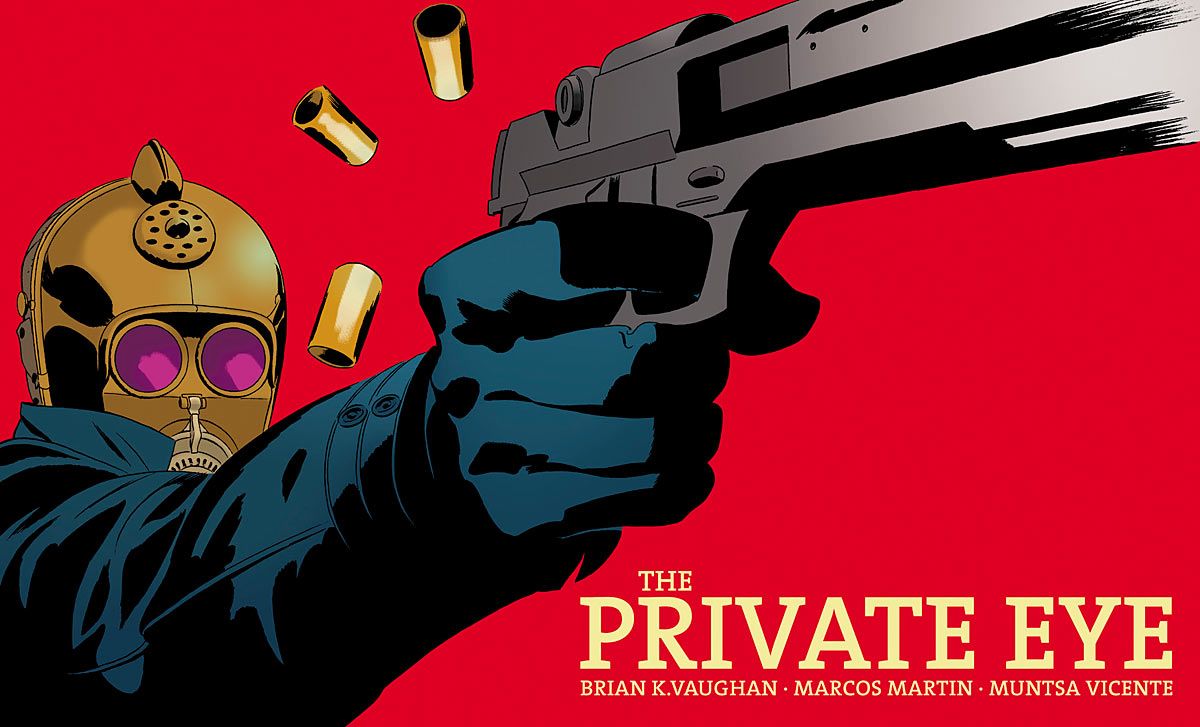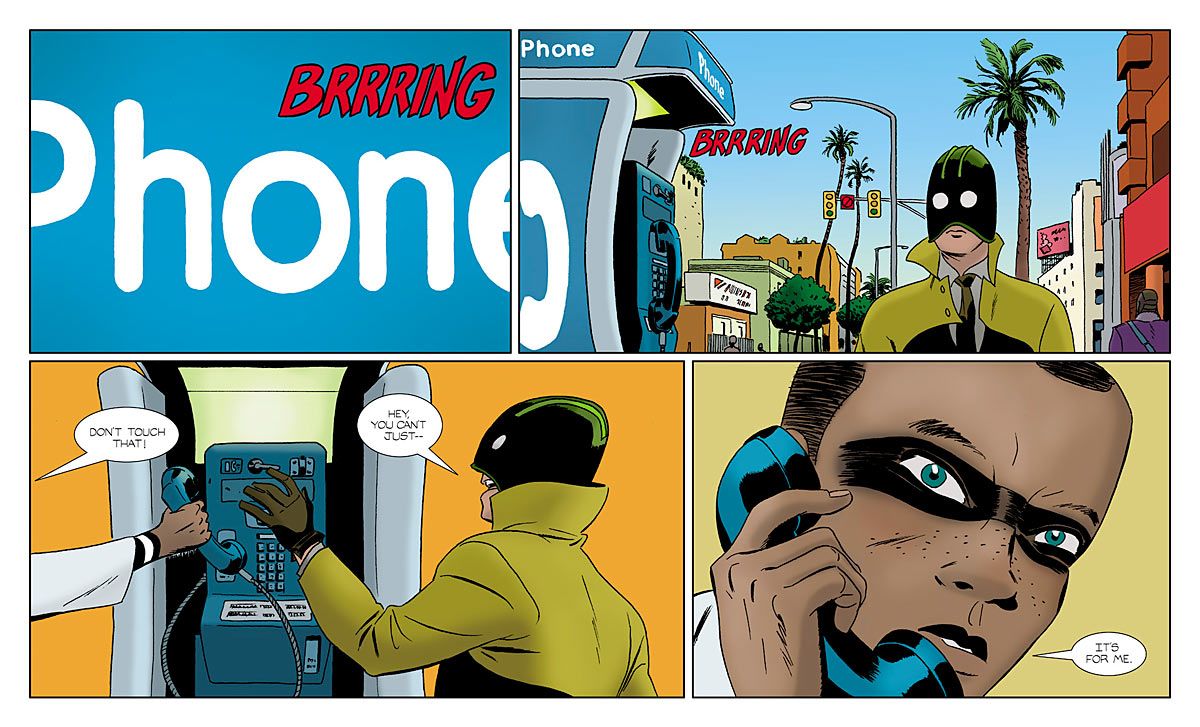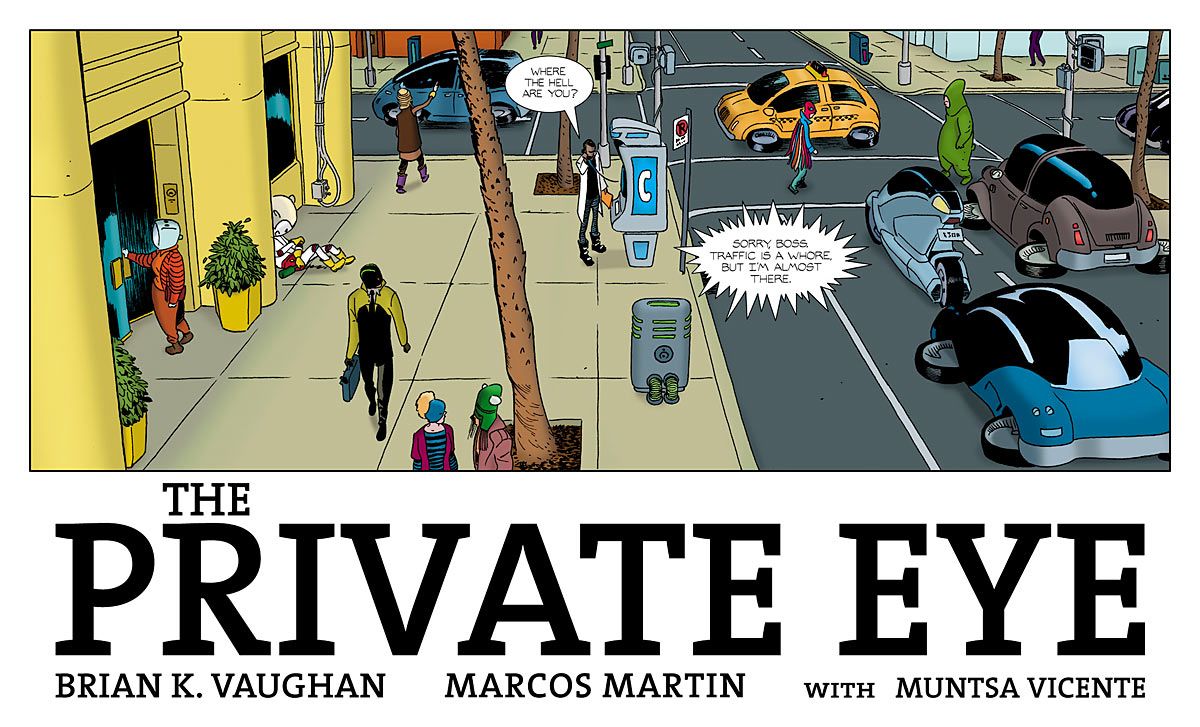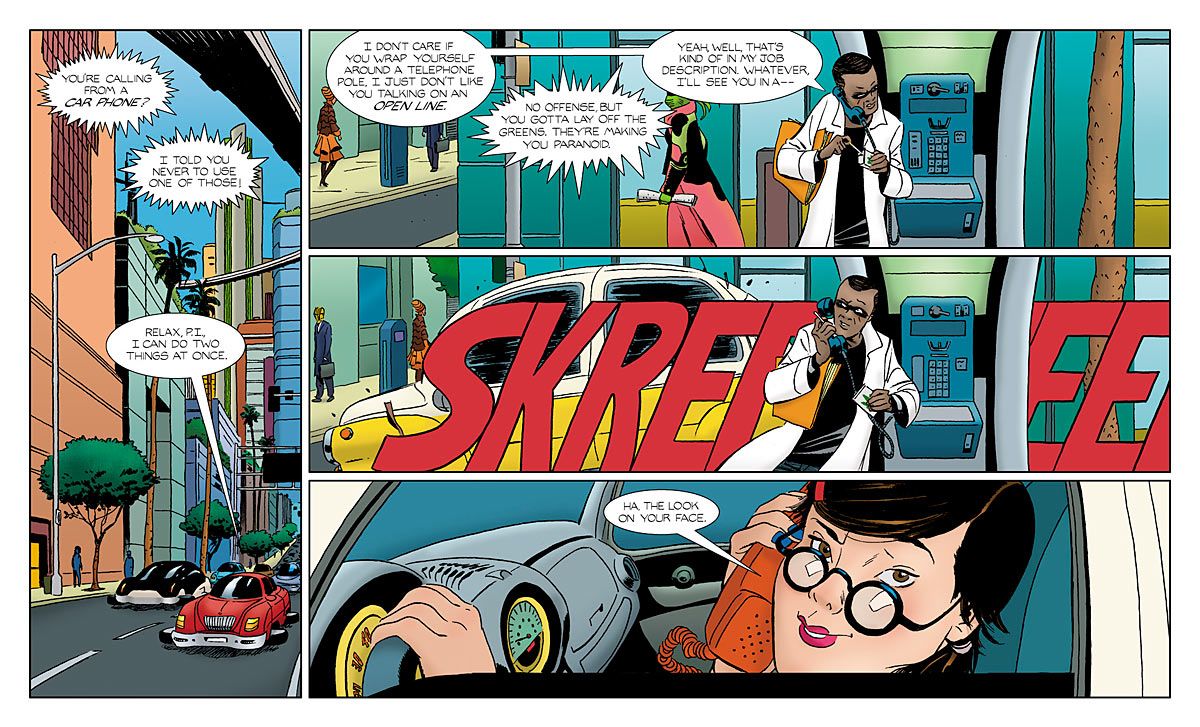"The Private Eye" hit the web in March with nary a peep from artist Marcos Martin or co-creator and writer Brian K. Vaughan -- but it landed like a tornado, a whirling dervish of story, art and marketability. There were tweets, retweets, favoriting of tweets, blog posts, Facebook posts, likes of posts, texts, e-mails, tumblr posts and more across the social media landscape. While both creators keep private lives, with neither of them maintaining any kind of social media presence, the truth of the matter is they don't have to. Both have earned enough of a readership and credibility to have others promote their work for them. Fans responded in droves, with Paypal even shutting down Panel Syndicate's account for a brief time over suspicious activity due to the massive influx of payments in such a short period of time.
With two issues now available to download at Panel Syndicate, the reception to the book has been outstanding. Following the model pioneered by Radiohead and Louis C.K., Martin and Vaughan have released a remarkable product with a "pay what you think it's worth" model. Like bees to honey, the masses have responded to "The Private Eye," a story about extreme privacy, and the lengths people will go to protect it -- or to strip it away. Martin spoke to CBR News about his digital concoction with Vaughan, his cantankerous relationship with both the writer and the colorist as well as his thoughts on privacy.
CBR News: Marcos, let's talk about Panel Syndicate's inception. Whose idea was it and where did come from?
Marcos Martin: I started thinking about a digital distribution model years ago. I've always felt that mainstream comics needed to find a bigger audience and lower the product price, which is the opposite of what's been happening for years now. Basically, to recapture the original concept of comic books as a popular product of entertainment. But do it in a way in which the creators are the main figure of the business model. For the first time, technology allows us to do just that. And I was hopeful that, through digital distribution, we'd be able to bring in more readers to traditional print comics, also. However, for something like this to even have the slightest shot at succeeding, I always knew I needed someone not only talented enough to come up with a great idea for a series, but with a big enough name in the industry to garner people's attention. And on top of it, crazy enough to consider this idea. Enter BKV.
How exactly did BKV pitch you on the idea of "The Private Eye?"
Well, at first I loved the idea behind "The Private Eye," but it took me a while to try and figure out the whole logic and the mechanics behind such a concept. It really wasn't until I realized that was the wrong approach, and I had to see it more as a fable, then it started to make sense to me. But really, I was sold the moment Brian called and told me about it.
What's it like going from a property like "Daredevil" to something like "The Private Eye?"
Creatively, it's a whole different animal since here I'm building up a whole world from scratch. When you're working with established characters that you've grown up reading there's already a well of ideas you can rely on and draw from, which always makes the work easier. And there's always that tingling of childhood joy that comes with the fact of knowing you're contributing to the history of characters that you've grown up with and that have become part of your life. Obviously, the satisfaction of working on something you've created and own completely is hard to beat, though.
Do you miss any part of working for a big corporation?
It might sound crazy but I really miss being in touch with all the people from editorial on a regular basis. I'm fortunate to say I've made some good friends over the years and I've loved working with them and being part of a team. But seriously, the paycheck.
What's the collaboration process like between you, Brian and colorist Muntsa Vicente?
It's not unlike most comic book collaborations. Brian will send me the script for the issue and we will then yell at each other over Skype discussing the this and that of the story. Then I'll go work on the layouts, scan them and send them over to Brian. We then Skype again, yell some more and I'm off to the drawing table. As soon as I have finished pages, I scan them and pass them on to Muntsa. Since she's my partner, I get to watch over her shoulder as she colors and give her directions over color tones, hues and the like until there's more yelling and she tells me to piss off. And when I come back the pages are done and look excellent. As I said, your typical comic book fare.
"The Private Eye" deals with hidden identities, due in large part to the cloud "bursting." People wear masks so Big Brother doesn't know everything they're doing, and what's private can remain private. What are your thoughts on privacy, especially when everyone shares the things they do on social media?
Well, neither Brian nor I have a website, Facebook or Twitter account. I don't even have a cell phone. So, I think that pretty much sums up our thoughts on privacy. Also, it definitely proves we are the worst imaginable people trying to pull off something like Panel Syndicate.
I'm really not one to share my personal life with every living person on the planet. And I'm fascinated by the fact that the importance of many news has now often been shifted from the news itself to what are one's thoughts, feelings or opinions about that news. But I also think there are many upsides to the sharing of information on social media and we'll be exploring that in "The Private Eye."
What are your plans once "The Private Eye" wraps?
I'm afraid I have no other plans right now other than "The Private Eye." I lack the speed and the ability to concentrate on working on two things at a time. Of course, that might all change and I might be forced to start looking for work in a matter of weeks. But I'm hopeful we'll have enough support to allow us to wrap up the series.
Speaking of support, the business model at Panel Syndicate -- DRM-free, in multiple languages, having the reader pay what they feel is fair -- is such a gamble, but according to issue #2's back matter it's working out quite well. Is this something you think more creators could do if they took the chance? And were you nervous at any point in the process?
It's working out quite well for now but I'm afraid it's too early to say if this is something that's viable in the long run or if it could work for other authors. The risk is too big and that's the reason why we wanted to try it ourselves before approaching anyone else. So far, so good.
I do think it's the best possible model since it establishes a new, more direct relationship between readers and creators in which they both share equal responsibility for the success of the work. As creators, we are responsible for creating a quality product to the best of our abilities, and the reader is responsible for deciding the value he/she thinks that product has, according to each one's perception, possibilities and personal circumstances.
And yes, there were moments when we were nervous, especially as we watched our savings gradually fade away. But we always believed the idea was worth trying out, so the possibility of failure never made us falter, anyway.
Are there any creators you think would rock this business model? Maybe anyone you'd invite over to the Panel Syndicate?
We'd love to open up Panel Syndicate to any creators who might be interested if/when we prove to be successful enough. But even if we're not, I think the possibility is now open to any creators to create their own Panel Syndicates, especially the big names in the industry. For once, creators have the chance to be at the helm, and I think it'd be foolish to let it pass up.
"The Private Eye" #2 is available nowat Panel Syndicate.





